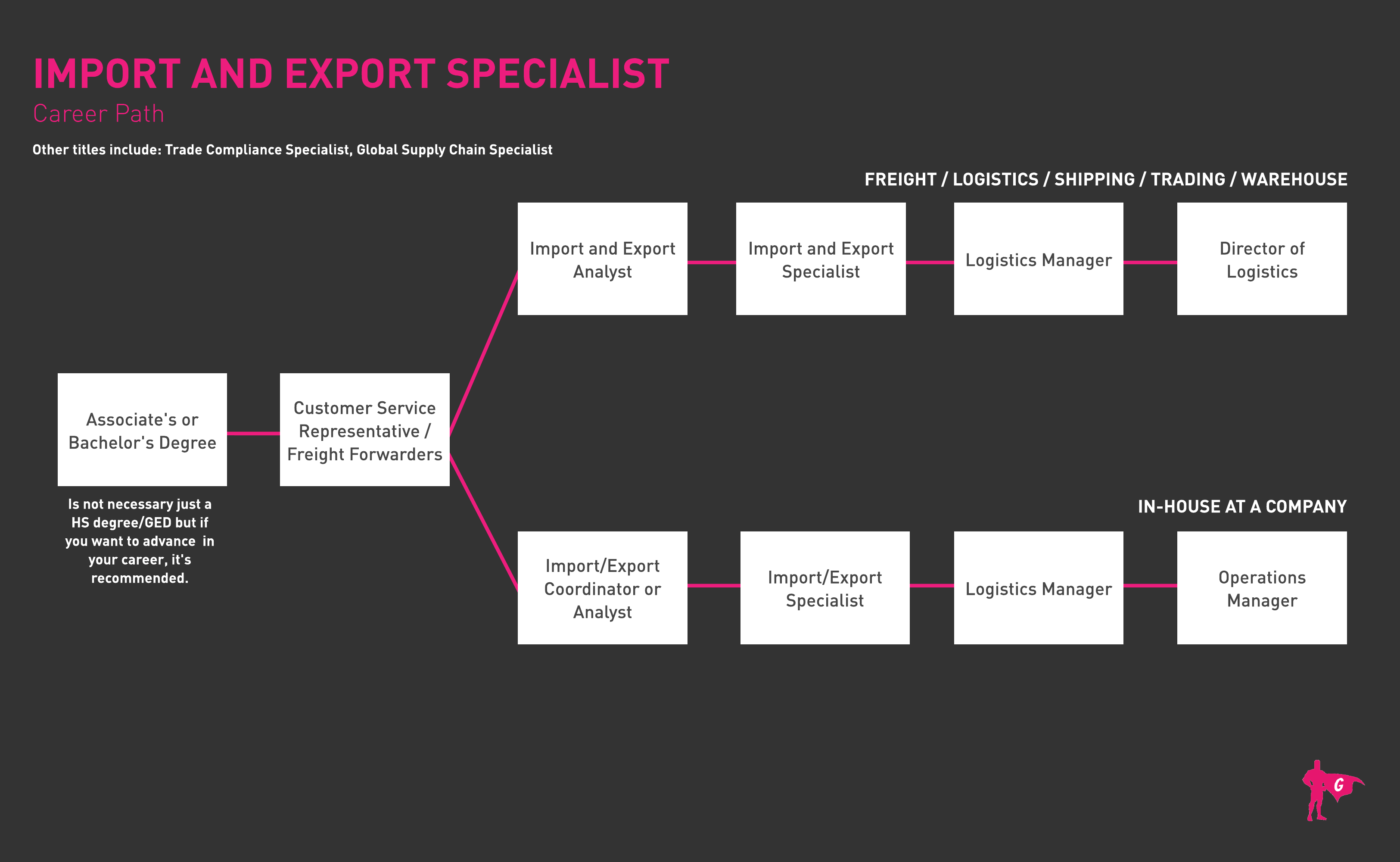Spotlights
International Trade Specialist, Global Logistics Coordinator, Customs Compliance Specialist, International Supply Chain Analyst, Trade Operations Manager, Freight Forwarding Coordinator, International Trade Compliance Manager, Export Compliance Officer, Import-Export Coordinator, International Trade Consultant, International Shipping Specialist
Import-Export Specialists organize the import or export of goods from or to foreign countries. These specialists are also called Import-Export Agents, Export Managers, Freight Forwarders, or Customs Brokers. Import Export Specialists are included in all aspects of the foreign trade business, including arranging the trade, coordinating the shipment, and overseeing the delivery of goods.
Since their work involves foreign trade, Import-Export Specialists are responsible for preparing customs documentation and acknowledging that all shipments meet import and export laws. For example, did you know that it is illegal to import a switchblade into the U.S. except if the person only has one arm? They must also keep up with taxes and process payments for clients. Import-Export Specialists also meet with customs officials on behalf of their clients.
- Flexible job schedule
- Opportunity to learn about different cultures through trade
- Become an expert on negotiation
Working Schedule
- Import-Export Specialists' hours and work environments can vary. They may work for customs or brokerage agencies or run their own business and work independently.
- Those who work in customs buildings and brokerage agencies will likely work 40-hour weeks. Evening and weekend work may be needed to negotiate trades. Those who are self-employed will have a more flexible schedule. Travel may be required for some jobs.
Typical Duties
- Prepare import/export documentation so that it complies with customs laws and regulations
- Make sure goods clear customs and make it safely to their destination
- Calculate duties and taxes owed on shipments
- Pay any shipping duties and taxes
- Classify goods by the tariff coding system
- Stay updated on import and export regulations and laws
- Use power of attorney to sign documents on the client's behalf
- Obtain bonds for imported products
- Arrange transportation, storage, and distribution of products
- Monitor the goods while in transit
- Apply for duty drawbacks or any other applicable refunds
- Purchase insurance on goods in case of loss or damage
Additional Responsibilities
- Advise clients on shipping options and transportation routes
- Suggest the best labeling and packaging products and methods
- Help coordinate the clearance of goods through customs
- Maintain relationships with other Import-Export Specialists and Customs Brokers
Soft Skills
- Active Learning
- Active Listening
- Critical Thinking
- Instructing
- Learning Strategies
- Mathematics
- Monitoring
- Negotiation
- Problem Solving
- Speaking
- Time Management
- Writing
Technical Skills
- Compliance software (ASYCUDA)
- Database user interface and query software (ACE, Microsoft Access)
- Electronic mail software (Microsoft Outlook)
- Enterprise resource planning (ERP) software (SAP software)
- Materials requirements planning logistics and supply chain software (MRP software)
- Office suite software (Microsoft Office)
- OCR or scanning software
- Project Management software (SAP customs management)
- Airlines
- Banks
- Customs and Border Protection
- Freight Operations
- Oil Companies
- Shipping Firms
- Trading Companies
- Warehouse Firms
Import Export Specialists work with companies all over the globe. They have the opportunity to travel both within and outside of the country. A lot of their work is done by computer and phone.
On the other hand, this is a busy job that can get stressful. Trade restrictions are something that an Import Export Specialist deals with frequently. Also, since they deal with international clients, an Import Export Specialist is often on call during evenings, holidays, and weekends.
The job growth for Import Export Specialists in the coming years is good. There is an average of 141,900 annual job openings in this career, which is growing at a rate of 5.6 percent each year. Boston, Chicago, Houston, Los Angeles, Miami, New Orleans, New York, and Seattle are all trading hotspots and excellent places to find employment as an Import Export Specialist.
Entry-level job positions are relatively easy to come by in this career, even without work experience. However, Import Export Specialists have the best chance at job advancement if they have a Bachelor's or Master's degree in Business Administration. Fluency in at least one foreign language is also a plus.
Import Export Specialists are good at crunching numbers and solving problems. So, they have probably always been good at math, maybe even Mathlete. They likely enjoy working and solving puzzles and are good at Chess and other strategic games.
Since Import Export Specialists work with many international clients, they must also be fluent in English communications. So they were most likely an exceptional English student as well. Speaking a foreign language is also beneficial to this job, so they probably took a foreign language course in high school or college and have always been interested in other cultures and traveling abroad.
- The minimum education requirement for Import Export Specialists is a high school diploma or GED
- According to ONet, 45% of Import Export Specialist jobs require a high school diploma or equivalent, 20 % require a post-secondary certificate, and 20 % require a Bachelor’s degree
- Import Export Specialists may get a Bachelor's degree in Business Management, Economics, or Political Science
- Some, especially those interested in management positions, have a Master's degree in Business Administration
- One to two years of on-the-job training is needed
- Training is done via hands-on practical work experience and working alongside experienced coworkers
- Getting an internship at an Import Export firm is an excellent way to get experience
- Anyone wanting to work as an Import Export Specialist must have a broker license
- Applicants must be 21 years old, a U.S. citizen, and pass the Customs Broker License Exam (CBLE) administered by U.S. Customs and Border Protection
- After passing the CBLE, a background check and a license fee are required to obtain a broker license officially
- Job advancement to management positions is available
- Many Import Export Specialists only have a high school level education
- Some have college experience, but no degree
- If you're interested in secondary education, community colleges offer two-year (associate) degrees, and tuition is more affordable
- Getting a four-year degree (Bachelor's) is an option, especially if you are interested in a management position, but it is not required
- The majority of Import Export Specialists with a two- or four-year degree major in Business Management
- Those with graduate degrees have a Master's degree in Business Administration
- A degree in Business Administration or Business Management can be earned online
- The National Customs Brokers & Forwarders Association of America (NCBFAA) offers the following certifications that Import Export Specialists may be interested in: Certified Customs Specialist, Master Customs Specialist, Certified Export Specialist, and Master Export Specialist.
- Take business or computer classes that will give you experience with software programs
- Concentrate mainly on business, English, and mathematics courses
- Study a foreign language such as Chinese, German, Japanese, Korean, or Spanish
- In college, take International trading and marketing courses if available
- Apply for an internship at an Import Export firm
- Stay familiar with government regulations and international trade policies
- Learn programs like Microsoft Word, Microsoft Excel, and Google Sheets
- Take courses that can improve your communication skills, such as the Active Listening Skills course offered by SkillPath
- Take a class that can sharpen your critical thinking skills, like Critical Thinking: Reasoned Decision Making from edX

- Make sure you have at least a high school diploma or GED. The more education and training you have completed, the better your chances are of getting hired
- Get your Customs Broker License
- Work experience is a plus. If you're unable to get an internship, working as a customer service representative is an excellent place to start
- Create a professional resume that highlights your skills and experience
- Ask an editor or a friend to review your resume for mistakes or ways to make it better
- Let people in your network know when you start your job search
- Research potential employers before you interview with them
- ZipRecruiter, SimplyHired, Indeed, Monster, and Glassdoor are good places to search online for Import Export Specialist jobs in your area
- Try to get experience in as many areas of the Import and Export business as you can, including supply chain management, customs regulations, warehousing, logistics, international shipping, and freight forwarding
- Set goals for your career path and stick to them. For example, if your goal is to become a Senior Logistics Manager, know the positions you will have to hold to work up to that title
- Keep expanding your linguistic skills by learning new languages online through Babbel or other sites
- Stay up to date on international trade policies, custom duties, and tariffs
- Demonstrate that you're able to handle a hectic work environment
- Ask your supervisors for any advanced training or courses you can take to expand your knowledge and skillset
- Ask a lot of questions and remain open to learning more
- If given the opportunity to train others, take the chance and share all that you've learned with them
Websites
- American Association of Exporters and Importers
- American Customs Association
- International Compliance Professionals Association
- International Federation of Customs Brokers Associations
- International Import Export Institute
- International Trade Administration
- Transportation Intermediaries Association
- United Shipping
Books
- How to Open & Operate a Financially Successfully Import Export Business by Maritza Manresa
- Start Your Own Import/Export Business: Your Step-by-Step Guide to Success by The Staff of Entrepreneur Media
- Import/Export: How to Take Your Business Across Borders by Carl A. Nelson
- Export/Import Procedures and Documentation by Donna Bade
While job growth for Import Export Specialists looks suitable for the upcoming decade, you may still decide to change to a similar profession or to take a break from your busy work environment. If you want to explore other options, check out related occupations listed by Career One Stop and O*Net Online:
- Brokerage Clerks
- Cargo and Freight Agents
- Compliance Officers
- Customs and Border Protection Officers
- Freight Forwarders
- Government Property Inspectors and Investigators
- Logisticians
- Procurement Clerks
- Regulatory Affairs Specialists
- Transportation Storage and Distribution Managers
Newsfeed

Featured Jobs

Online Courses and Tools







